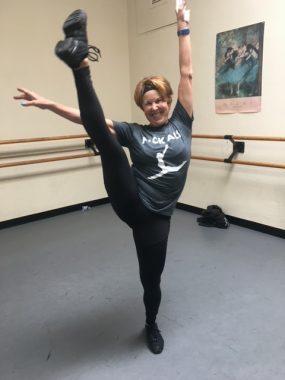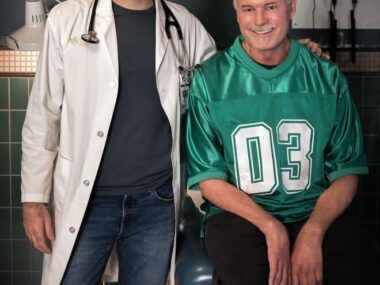Performer With ALS Returns to Acting for ‘Reel’-life Diagnosis
Written by |

Lisa Cross, 66, was diagnosed with ALS in 2017. (Courtesy of Lisa Cross)
Lisa Cross thought having amyotrophic lateral sclerosis (ALS) meant she would have to give up on acting and the theater.
A longtime stage actor, Cross, 66, had worked in just about every aspect of the entertainment industry: she was a dancer and singer; a director, choreographer, and teacher; an artist; and, for the opera, a professional wig and makeup designer.
She was diagnosed with ALS in 2017 following a year of testing and procedures. At the time, she was teaching theater, dance, and creative art to high schoolers in Northern California. But she had to soon stop working as the disease progressed. In December, she quit dancing as her limbs began to weaken. She began falling and lost the use of her right arm.

Lisa Cross was recently forced to stop dancing as her ALS progressed. (Courtesy of Lisa Cross)
She soon found, however, that the performance bug hadn’t gone away for long.
Cross is now set to appear in the independent horror-thriller, “New Life,” as Laura, a woman with ALS guiding the main character, Elsa, as she copes with her own diagnosis. The film is currently in post-production and does not yet have a release date or platform.
Los Angeles writer and director John Rosman said he wanted to ensure that he was accurately portraying the disease by casting someone who actually had to deal with it every day.
“If we’re talking ALS, I do feel a responsibility to do it right,” Rosman, 30, said. “Let’s try and do it right and come from a place with heart and honesty, and I think the most central part of that is, if someone in this capacity has ALS, actually put someone with ALS on the screen.”
Rosman cast Cross in the role after she saw his casting call on an ALS News Today forum post.
“I was just so excited to be acting again, I thought I’d left that forever,” Cross said from her home in San Mateo, California, where she lives with her husband. “Because it takes a lot of energy, and I just did not see it as an option. So it was really, really wonderful to be considered for this.”

John Rosman is a journalist turned filmmaker. (Courtesy of John Rosman)
The filmmaker had contacted forum moderator and ALS News Today columnist Dagmar Munn while he was writing the script. When it was time to find someone to help bring to life a character with ALS, Munn shared the casting call with forum members.
Rosman soon connected with Cross and scheduled a Zoom audition.
“She’s just a really inspiring, awesome, positive person who’s so generous with her time, and open. But she’s also an incredible actress,” Rosman said. “We gave her lines and she knocked it out of the park.”
His inspiration for a movie about ALS came in part, Rosman said, from his affection for the movie, “The Fly.” That 1986 film was meant to shock its audience with its depiction of a man who is transformed into a fly. But the movie also carries an underlying subtext about dealing with illness and being trapped in your body — which parallels the experience of people living with ALS, and how the disease eventually robs them of their physical movement, Rosman said.
He also was inspired by a young woman, Summer Whisman, who he met while helping produce the show “Think Out Loud” for Oregon Public Broadcasting. Whisman was interviewed for the segment.
“On the surface it was pretty jarring to see someone my own age dealing with something so massive and big,” Rosman said. “But what took me aback at the time was the deep sense of positivity, and deep well of hope. It was really inspiring, and it always stuck with me.”
In his movie, Elsa is a career-driven woman who is faced with having to make difficult decisions in the wake of her diagnosis. Throughout the movie, Rosman weaves in some of Whisman’s story as Elsa learns to come to grips with her diagnosis.
“Life happens and something really unexpected gets thrown your way and it turns everything upside down. And you are kind of reeling in the aftermath of that. So that’s kind of where we meet her,” Rosman said.
In the movie, Cross’ character, Laura, holds a video conference with Elsa. The lead character is played by Sonya Walger, 48, who starred as fan-favorite Penny Widmore in the TV drama “Lost,” and had roles in “CSI: NY,” and “Parenthood.” Cross and Walger’s meeting is a short, three-minute scene, but Cross said it required her to really lean on her acting skills.
While Cross doesn’t yet need to use a wheelchair, here she had to portray someone whose disease was more advanced than hers. For the scene, she used the wheelchair her sister, Carol, who also had ALS, had used before the disease claimed her life. Cross was made up to look frail and had to train herself to be as still as possible.
The scene was filmed in San Francisco, at the house of Cross’ other sister. She later told Cross that the performance reminded her of Carol just before she died. Cross has familial ALS, and her two sisters and brothers are carriers. She said filming that scene was a deeply moving experience for her.
“It was really emotionally deep to be in that chair as she [Carol] did when she was close to death,” Cross said.
As part of her work for the film, Cross also coached Walger about how best to mirror someone who had just been diagnosed with ALS. She described what an ALS cramp looks like, and when falling starts to happen more regularly.
For Cross, this performance was in part about educating others.
Including ALS in a movie helps improve awareness and understanding of the disease, she said.
While Cross has seen ALS portrayed in the cinema of other countries, she said it’s unusual to find a character with ALS in films in the U.S. Even rarer is for the character to be played by someone with ALS.
“I see ALS as an underfunded disease more than incurable,” Cross said. “So the more awareness there is of this rare disease, the better.”
Rosman said he was taken aback while working on the film at the unrelenting spirit of those who have been diagnosed with ALS. He said he was profoundly changed by what his research uncovered and intends to include what he learned for the film.
“Life is still life, no matter how difficult it can be,” Rosman said. “It is something worth protecting and worth fighting for.”







